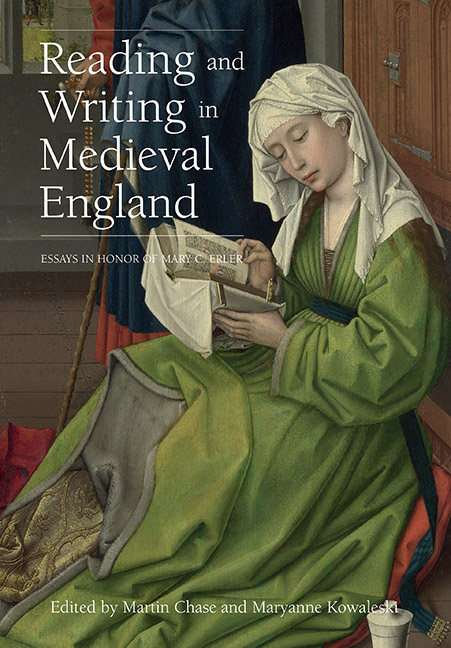Book contents
- Frontmatter
- Contents
- List of Illustrations
- List of Contributors
- List of Abbreviations
- Introduction: Bibliography in the Service of Biography
- “Withinne a Paved Parlour”: Criseyde and Domestic Reading in a City under Siege
- Beatrice Melreth: A London Gentlewoman and her Books
- How Intellectual Were Fifteenth-Century Londoners? Grammar versus Logic in the Citizens’ Encounters with Learned Men
- Social Memory, Literacy, and Piety in Fifteenth-Century Proofs of Age
- Crafting the Old Testament in the Queen Mary Psalter
- Affective Reading and Walter Hilton's Scale of Perfection at Syon
- Book Accessories, Gender, and the Staging of Reading
- Enska Vísan: Sir Orfeo in Iceland?
- Reading the Real Housewives of John Foxe's Book of Martyrs
- The Writings of Mary Carpenter Erler
- Index
- Tabula Gratulatoria
Social Memory, Literacy, and Piety in Fifteenth-Century Proofs of Age
Published online by Cambridge University Press: 21 June 2019
- Frontmatter
- Contents
- List of Illustrations
- List of Contributors
- List of Abbreviations
- Introduction: Bibliography in the Service of Biography
- “Withinne a Paved Parlour”: Criseyde and Domestic Reading in a City under Siege
- Beatrice Melreth: A London Gentlewoman and her Books
- How Intellectual Were Fifteenth-Century Londoners? Grammar versus Logic in the Citizens’ Encounters with Learned Men
- Social Memory, Literacy, and Piety in Fifteenth-Century Proofs of Age
- Crafting the Old Testament in the Queen Mary Psalter
- Affective Reading and Walter Hilton's Scale of Perfection at Syon
- Book Accessories, Gender, and the Staging of Reading
- Enska Vísan: Sir Orfeo in Iceland?
- Reading the Real Housewives of John Foxe's Book of Martyrs
- The Writings of Mary Carpenter Erler
- Index
- Tabula Gratulatoria
Summary
This essay draws on Proof of Age hearings that were conducted by a local jury of twelve men as part of royal Inquisitions Post Mortem to establish that an heiress or an heir had reached the age of majority and could now claim her or his estate. The oral testimony of the jurors consists largely of memories that indicate how and why the critical day of the heir's birth or baptism – many years earlier – sticks in their minds. These all-male juries offer a large number of very terse (or compressed) testimonies – hundreds and hundreds of “memories” providing us with an array of mnemonic tales, mostly in the form of one-line recollections. What light do these memories shed on the jurors’ world, mixing recollections of the mundane with the picturesque, the highly personal with the disinterested or what was learned at second or third hand? I argue here that even if many of the memories offered are formulaic, in some instances perhaps the mere recitation of a standardized, boiler-plate recollection, they are nevertheless of great interest because of what memories and what kinds of memories – whether genuine or not – have been selected. As Brian Stock reminds us, “the single great storehouse of meaning is memory,” and there was a vast array of memories and false memories from which to pick and choose. Here we are dealing with “social memory” – memory articulated in public before one's peers, by men participating in a formal act of inquiry.
This essay focuses on several specific categories of testimony, of memory, that have been selected from the wide assemblage of jurors’ testimonies because they complement two themes characteristic of Mary Erler's scholarship. One is that of literacy, written records, and books. The other is more diverse: memories that reflect the laity's interest in, knowledge of, and involvement in matters of the church; that is, with the church as the guardian of a belief system and as an institution overseeing and touching upon much of daily life. Memories of this latter sort rest on the proposition that the lives of the laity were closely interwoven with the rituals, structure, and personnel of the church and, furthermore, that the laity were aware of and knowledgeable about such issues.
- Type
- Chapter
- Information
- Reading and Writing in Medieval EnglandEssays in Honor of Mary C. Erler, pp. 81 - 99Publisher: Boydell & BrewerPrint publication year: 2019



